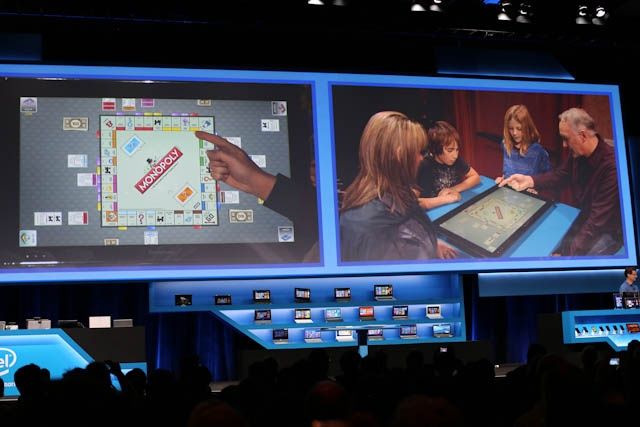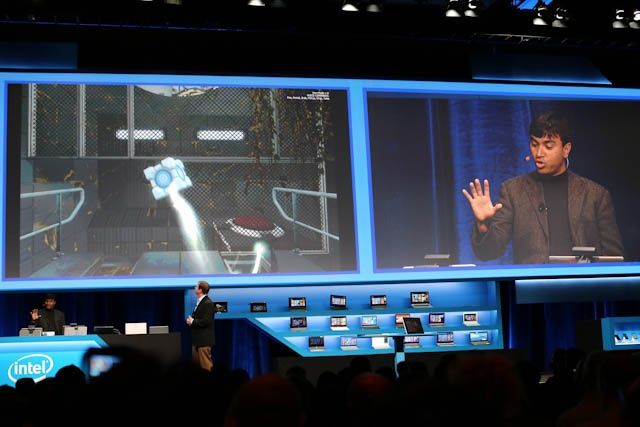 LAS VEGAS, CES 2013 – Everything you need to know about how Intel wants you to see them was summed up in a bizarre Ken Burns-style documentary that aired at the beginning of their CES presser, in which Intel compared their new ultrabook and tablet initiatives to Notre Dame’s use of the forward pass back in 1913 to utterly dominate the Army Cadets, a team considered much superior. The odd, old-timey documentary ended with a virtual CGI football hurtling at the screen, only to explode in a nuclear fireball just before it hit the camera. “WELCOME TO THE NEXT GAME CHANGER,” Intel blared.
LAS VEGAS, CES 2013 – Everything you need to know about how Intel wants you to see them was summed up in a bizarre Ken Burns-style documentary that aired at the beginning of their CES presser, in which Intel compared their new ultrabook and tablet initiatives to Notre Dame’s use of the forward pass back in 1913 to utterly dominate the Army Cadets, a team considered much superior. The odd, old-timey documentary ended with a virtual CGI football hurtling at the screen, only to explode in a nuclear fireball just before it hit the camera. “WELCOME TO THE NEXT GAME CHANGER,” Intel blared.
If you know anything about the game in question, though, you know that Notre Dame didn’t actually invent the forward pass, though. They just swiped it from another team and popularized it.
So according to this analogy, who is Intel? They’re clearly Notre Dame, stealing another team’s moves. And that team is obviously Apple. Some game changer.
A common recurring theme today was that Intel wants to continue to integrate hardware and services. Intel doesn’t have its own operating system like Apple does, but there’s a lot of talk about mandatory integration of key Intel technologies, like Intel’s Wireless Display (WiDi) or even touch capabilities in all devices. If you want to release an Intel-based ultrabook in 2013, Intel says you need to support these technologies. WiDi is a clear AirPlay parallel, and Intel wants all ultrabooks to have touch so that the iPad and other tablets that run on ARM-based chips stop eating their x86 lunch.
The iPad is clearly a device that is just worrying the fuck out of Intel, and a device they want to convince people they don’t need. Intel was pimping what they called “covertible & detachable” laptops hard today, and they even showed off 27-inch all-in-ones like the MacBook Air with built-in battery that you can just slap down on a coffee table to play Monopoly with your kids, no wires required.

All very cool, but what it comes down to is that Intel’s response to the iPad is to try to make it mandatory that all PCs be more iPad-like. It comes across as a bizarre, panicked form of corporate logic; a bunch of guys shaking you and saying, “Hey, why would you possibly want to buy a tablet running some stinky ARM chip when your Intel-based PC can turn into an even bigger and bulkier tablet?”

How else does Intel want to change the game? Intel’s talking a lot now about perceptual computing, or the ability to use your computer without a keyboard and mouse, but by moving your eyes, touching the screen, using voice control, eye detection or even controlling objects on the screen in three-dimension using a Kinect-like 3D USB camera, which they promise will go on sale this year. Intriguing technology, maybe, but Intel doesn’t actually have any use-cases for any of this stuff that look more effortless than a keyboard and mouse. It’s as if, having been caught off-guard by Siri and multi-touch, Intel is scrambling after the next big input technology, but they have none of Apple’s showmanship to sell it. When the best use case scenario you can find for perceptual computing is showing a product engineer playing a “Where’s Waldo” game by unblinkingly staring at the same part of the screen for five minutes, you know there’s a problem.
The truth of the matter is that the most exciting, game-changing aspects of Intel’s presser all involved the one thing that Intel is better than anyone at doing: making powerful chips. We’ll have a separate post up about those shortly, but Intel’s predicting MacBook Air-style ultrabooks that are 20% thinner and lighter with 13-hour battery life by the end of the year.
You know what? That’s exciting. Maybe not as exciting as an exploding nuclear football, but hey: at least it’s the play Intel’s been running better than anyone for decades.
![Intel’s Game-Changer: Let’s Make All PCs Like iPads, Guys [CES 2013] INTEL](https://www.cultofmac.com/wp-content/uploads/2013/01/INTEL.jpg)


